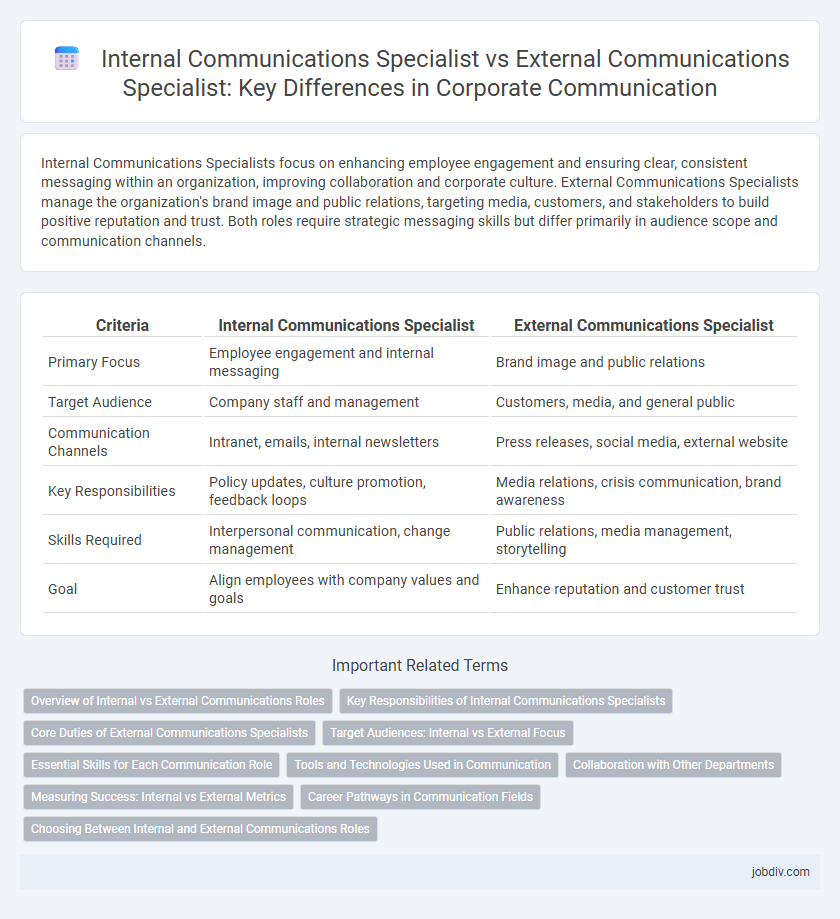Internal Communications Specialists focus on enhancing employee engagement and ensuring clear, consistent messaging within an organization, improving collaboration and corporate culture. External Communications Specialists manage the organization's brand image and public relations, targeting media, customers, and stakeholders to build positive reputation and trust. Both roles require strategic messaging skills but differ primarily in audience scope and communication channels.
Table of Comparison
| Criteria | Internal Communications Specialist | External Communications Specialist |
|---|---|---|
| Primary Focus | Employee engagement and internal messaging | Brand image and public relations |
| Target Audience | Company staff and management | Customers, media, and general public |
| Communication Channels | Intranet, emails, internal newsletters | Press releases, social media, external website |
| Key Responsibilities | Policy updates, culture promotion, feedback loops | Media relations, crisis communication, brand awareness |
| Skills Required | Interpersonal communication, change management | Public relations, media management, storytelling |
| Goal | Align employees with company values and goals | Enhance reputation and customer trust |
Overview of Internal vs External Communications Roles
Internal Communications Specialists focus on enhancing employee engagement, aligning organizational goals, and facilitating information flow within the company through intranet, newsletters, and town hall meetings. External Communications Specialists manage the organization's public image, media relations, and brand messaging via press releases, social media, and public events. Both roles require strong communication strategies but differ in audience focus: internal targets employees, while external targets customers, media, and stakeholders.
Key Responsibilities of Internal Communications Specialists
Internal Communications Specialists focus on enhancing employee engagement by managing internal messaging, coordinating company-wide announcements, and facilitating transparent information flow across departments. They develop and implement communication strategies that align with organizational goals, promoting a cohesive work culture and ensuring consistent understanding of policies and initiatives. Their role involves creating internal newsletters, managing intranet content, and organizing town hall meetings to foster collaboration and employee alignment.
Core Duties of External Communications Specialists
External Communications Specialists manage public relations by crafting press releases, handling media inquiries, and coordinating corporate messaging to maintain a positive brand image. They develop and execute communication strategies targeting external audiences, including customers, investors, and partners, ensuring consistent and clear information dissemination. Monitoring media coverage and managing crisis communication are essential duties to protect and enhance the organization's reputation.
Target Audiences: Internal vs External Focus
Internal Communications Specialists concentrate on engaging employees, improving workplace culture, and ensuring consistent messaging within an organization. External Communications Specialists target customers, stakeholders, and the public to enhance brand reputation and manage public relations. Both roles require tailored strategies to meet the distinct needs of internal and external audiences effectively.
Essential Skills for Each Communication Role
Internal Communications Specialists excel in interpersonal communication, change management, and employee engagement strategies, ensuring clear and consistent messaging within an organization. External Communications Specialists master public relations, media outreach, and brand messaging to influence public perception and maintain a positive company image. Both roles require strong writing skills, strategic thinking, and adaptability to effectively navigate internal culture or external market dynamics.
Tools and Technologies Used in Communication
Internal Communications Specialists frequently utilize intranet platforms, enterprise social networks like Microsoft Teams or Slack, and email marketing tools such as Mailchimp to streamline employee engagement and information dissemination. External Communications Specialists rely heavily on media monitoring tools like Cision, customer relationship management (CRM) software such as Salesforce, and social media management platforms including Hootsuite or Buffer to manage public relations and brand reputation. Both specialists leverage analytics tools to measure communication effectiveness but tailor their technology stacks to internal culture or external audience strategies.
Collaboration with Other Departments
Internal Communications Specialists collaborate closely with HR, IT, and management teams to ensure consistent messaging and employee engagement across the organization. External Communications Specialists coordinate with marketing, public relations, and sales departments to craft unified brand messaging and manage public perception. Both roles require seamless interdepartmental collaboration to align communication strategies with overall business objectives.
Measuring Success: Internal vs External Metrics
Internal Communications Specialists measure success through employee engagement surveys, intranet analytics, and feedback on internal campaigns, focusing on clarity, motivation, and organizational alignment. External Communications Specialists evaluate success using media coverage, social media metrics, brand awareness studies, and customer sentiment analysis to gauge public perception and market impact. Both roles rely on data-driven insights but prioritize different key performance indicators tailored to internal audience connection and external brand reputation.
Career Pathways in Communication Fields
Internal Communications Specialists develop expertise in employee engagement, change management, and corporate culture, often advancing toward roles like Internal Communications Manager or HR Communications Director. External Communications Specialists focus on public relations, media relations, and brand messaging, paving the way to careers as Public Relations Manager or Corporate Communications Director. Both pathways offer growth in strategic communication roles, with specialization aligning to organizational impact and audience focus.
Choosing Between Internal and External Communications Roles
Internal Communications Specialists focus on fostering employee engagement, ensuring clear, consistent messaging within the organization to enhance culture and productivity. External Communications Specialists manage public relations, brand reputation, and media relations to influence public perception and customer engagement. Choosing between these roles depends on whether you prefer shaping internal organizational dynamics or driving external audience interactions and brand visibility.
Internal Communications Specialist vs External Communications Specialist Infographic

 jobdiv.com
jobdiv.com